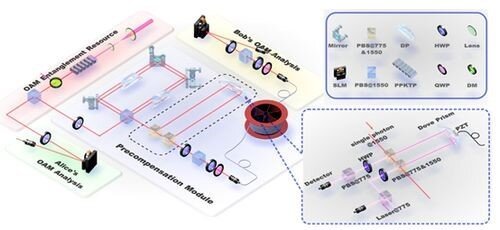A team led by Prof. Guo Guangcan from University of Science and Technology of China (USTC) of the Chinese Academy of Sciences (CAS) and collaborators first realized distribution of high-dimensional orbital angular momentum entanglement over a 1 km few-mode fiber. The result is published in Optica.
Increasing the channel capacity and tolerance to noise in quantum communications is a strong practical motivation for encoding quantum information in multilevel systems, qudits as opposed to qubits. From a foundational perspective, entanglement in higher dimensions exhibits more complex structures and stronger non-classical correlations. High-dimensional entanglement has demonstrated its potential for increasing channel capacity and resistance to noise in quantum information processing. Despite these benefits, the distribution of high-dimensional entanglement is relatively new and remains challenging.
The orbital angular momentum of photon is a high dimensional system which has been paid much attention to in recent years. However, orbital angular momentum entanglement is susceptible to atmospheric turbulence or mode crosstalk and mode dispersion in optical fibers. It can only transmit a few meters, and is limited to two-dimensional entanglement distribution.
In this work, researchers reported the first distribution of three-dimensional orbital angular momentum (OAM) entanglement via a 1-km-long few-mode optical fiber.
Using an actively stabilizing phase precompensation technique, they successfully transported one photon of a three-dimensional OAM entangled photon pair through the fiber. With their measures, they are able to certify three-dimensional entanglement via a fidelity to the three-dimensional maximally entangled state (MES) of 0.71, and a violation of a Collins–Gisin–Linden–Massar–Popescu (CGLMP) inequality.
Find your dream job in the space industry. Check our Space Job Board »
In addition, they certified that the high-dimensional quantum entanglement survives the transportation by violating a generalized Bell inequality, obtaining a violation of ~3 standard deviations.
They showed that preserving the wavefront is possible with precompensation, potentially enabling further information processing after the fiber. The method developed can be extended to a higher OAM dimension and larger distances in principle.
Their work is a significant step forward for distributing high-dimensional entanglement in the transverse spatial modes of photons. In the future, they hope that together with recent results on the noise resilience exploiting higher dimensions, the work will motivate further experimental research into novel protocols that involve long-distance high-dimensional quantum communications through fiber.
Provided by: Chinese Academy of Sciences
More information: Huan Cao et al. Distribution of high-dimensional orbital angular momentum entanglement over a 1 km few-mode fiber. Optica (2020). DOI: 10.1364/OPTICA.381403
Image: Schematic of the experimental setup for high-dimensional orbital angular momentum entanglement distribution.
Credit: CAO Huan
